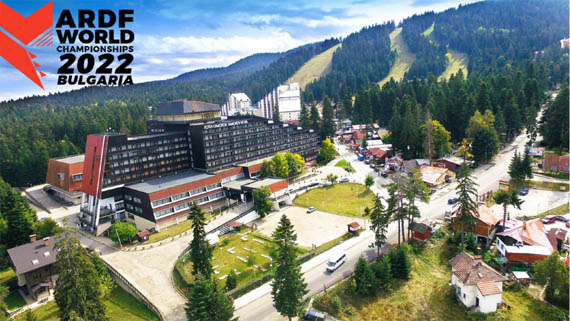

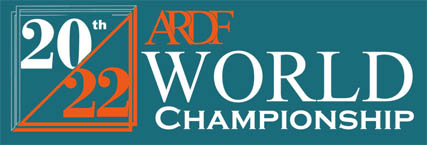 It began as a private hunting ground for Bulgarian kings. Now it's a modern ski resort on the Rila Mountains, complete with fine hotels and one of the world's greatest biathlon courses. That's Borovets, located about 25 miles southeast of Sofia, the capital city of Bulgaria. During the first week of September, Borovets was the site of the 20th World Championships of Amateur Radio Direction Finding (ARDF), hosted by the Bulgarian Federation of Radio Amateurs (BFRA).
It began as a private hunting ground for Bulgarian kings. Now it's a modern ski resort on the Rila Mountains, complete with fine hotels and one of the world's greatest biathlon courses. That's Borovets, located about 25 miles southeast of Sofia, the capital city of Bulgaria. During the first week of September, Borovets was the site of the 20th World Championships of Amateur Radio Direction Finding (ARDF), hosted by the Bulgarian Federation of Radio Amateurs (BFRA).
These championships were a long time coming. World Championships are normally held in even-numbered years in Europe or Asia. National Amateur Radio societies make proposals to the International Amateur Radio Union (IARU) ARDF Working Groups in hopes of hosting. A proposal by The Amateur Radio Union of Serbia (SRS) to host in 2020 was accepted back in 2017. The pandemic forced SRS to cancel and reschedule for 2021, but that also became a no-go. It was thought that COVID case counts would be significantly lower and travel restrictions would be lifted in time for another try in 2022, but many Asian countries were still under severe limitations. Korea was the only nation in IARU Region 3 that submitted a Letter of Intent to participate.
Two Dozen Selected
In the spring, the ARRL ARDF Team Selection Subcommittee optimistically announced that 24 persons were being offered the opportunity to represent USA at the 2022 World Championships. If all had accepted, this would have been the largest ARDF Team USA ever to participate in the World Championships and would have included 17 men, 6 women and one youth.
Countries in the former Soviet bloc, such as Russia, Ukraine and the Czech Republic, have traditionally been the big winners at the world ARDF Championships. Most have established national teams that train together all year and are whose travels are supported by the government. In the past, it was not uncommon for these three nations to win over 90% of the medals. But these countries' predominance has lessened as radio-orienteers in more countries, including USA, have improved their performances. By contrast, Team USA members are true amateurs, who train mostly in their home states and pay their own way to all events. That makes our progress in the sport quite remarkable. The last time BFRA hosted the World Championships was 2006 and it was a memorable year for Team USA. Team members reported that the courses were physically and mentally the toughest they had ever encountered. There was also an outbreak of norovirus among the attendees that sidelined some team members. Despite these adversities, Nadia Scharlau, now-KO4ADV captured a bronze medal in the 2006 80-meter classic event. Stateside radio-orienteers have continued to improve and at the last pre-COVID championships in Korea during 2018, our eleven-member team garnered a total of ten medals. So that set the stage for fierce competition among the European and American radio-orienteers in 2022.
Everything changed on February 24, 2022, when Russian forces invaded Ukraine. The Russian Ministry of Sports considers Serbia to be a "friendly" country, so the Russian ARDF team continued making plans to attend. IARU leaders did not ban the Russians, but competitors from Ukraine and numerous other countries immediately made it clear that they would not participate if Russians were allowed to be there. Serbian leaders realized that the greatly reduced attendance due to the war, plus the continued high incidence of COVID and travel restrictions in Asian countries, meant that hosting the championships would not be economically viable for them. On May 9, 2022, SRS announced cancellation of the Serbian events. IARU Region 1 leaders immediately sought another national society to take on the championships on short notice. On June 8, BFRA stepped forward and offered to host at the Borovets resort on the same dates. Bulgaria had no COVID-related entry and stay restrictions. The matter of Russian or Ukrainian competitors at the World Championships was settled on July 2, when the Russian Ministry of Sports announced that the Russian team would not be permitted to attend because, as a member of the European Union, Bulgaria was considered to be an "unfriendly country" to Russia.
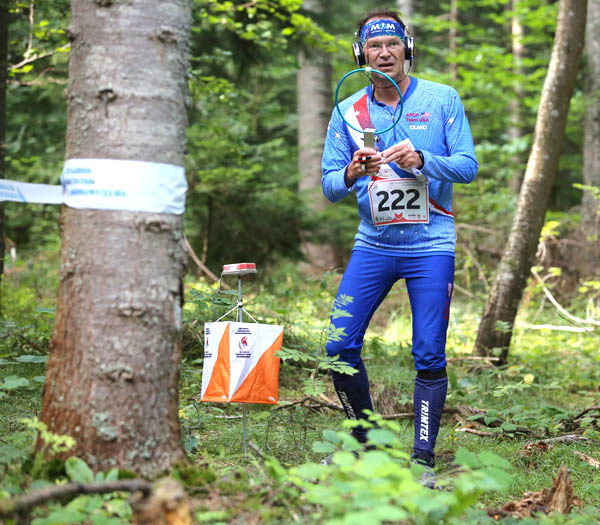
To nobody's surprise, 2022 attendance was off by over 30 percent compared to the last World Championships in 2018. For the first classic event, the 207 starters included 25 from Ukraine, 33 from Czech and 17 from Slovakia. Almost all of the rest were from other European countries. The only competitor from Asia was Inwon Lee, HL2IYI from Korea. Because of the lateness of the announcements, the difficulties of air travel and concerns about COVID and other illnesses, there were only four members of Team USA in attendance: Elizabeth Afonkin (W19), Vadim Afonkin, KB1RLI (M50), Gheorghe Fala (M21) and Alexander Myachin (M50). This was our smallest team since USA first attended the World Championships in 1998.
Triumphing on 80 Meters
As a prelude to the World Championships for national teams, BFRA hosted the World ARDF Cup for individuals from August 24 through 27. In the 80-meter classic competition on August 26, Alexander Myachin and Vadim Afonkin KB1RLI took second and third place, respectively, finding four required foxes in a 6. 1 kilometer route. With that auspicious beginning, the stage was set for even better news on September 1 in the second classic event of the World Championships. This day featured two full five-fox courses, one on two-meter AM and the other on eighty-meter CW. Groups of competitors in different categories started at five minute intervals, some for one band and the rest for the other band. They sought the required transmitters for their category and then rushed to the finish, which was in a different location from the start.
In ARDF, the required foxes may be found in any order. There is a continuous transmitter on a separate frequency near the finish to help those who get lost, lose their map or break their glasses. Measured point-to-point from start to each fox and then to the finish by the shortest route, the courses for various categories ranged from 4.7 to 5.8 kilometers. But of course it wasn't always possible to run point-to-point in these difficult courses.
On this day, KB1RLI triumphed over two dozen other competitors in the M50 category, finding five 80-meter fox transmitters in just 53:04. He was 24 seconds ahead of Zbynek Zacek from the Czech Republic, who took second place. Normally, the M50 category competitors are required to find only four of the five transmitters, but this event was unusual because M21 and M50 were required to find all five on a course with optimum route of almost 5 kilometers.
In World Championship classic events, there are medals for the first three individuals in each category. There are also national team awards in each category, based on the aggregate scores of the two or three individual team members. The team members are not permitted to assist one another on the courses. In addition to Vadim's individual gold medal, he and Alexander Myachin captured bronze for USA in the M50 team aggregate score standings.
Congratulations to Vadim and Alexander! Another up-and-coming member of the team was Elizabeth Afonkin, the teenage daughter of Vadim, who competed in the W19 category for women ages 19 and under. She did not win World Championship or World Cup medals in Bulgaria, but this was not surprising because so many in her category were considerably older. But back in July 2022, Elizabeth ran in the 15th Balkan ARDF Championship and ARDF Black Sea Cup. There in the W16 category for ages 16 and under, Elizabeth took second place in all four events, which had course lengths up to 4.5 kilometers. Congratulations to Elizabeth!
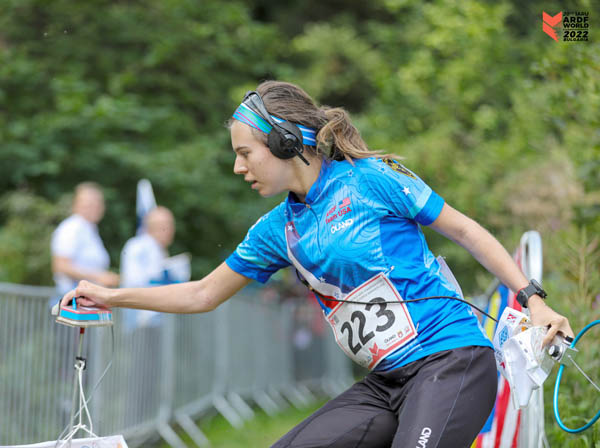
Complete results of the 2022 World Championships are posted at the Deutscher Amateur-Radio Club Web site. The Bulgarian organizers' official 2022 championships Web site is no longer active.
Portions of this report have been excerpted from my Homing In column in the November 2022 issue of CQ Amateur Radio Magazine.
Text and photos copyright © 2022 Joseph D. Moell. All rights reserved.
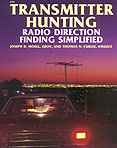 Go to Championships Foxhunting News -- Recent and upcoming ARDF championships events
Go to Championships Foxhunting News -- Recent and upcoming ARDF championships events
Go to International-Style Foxhunting Comes To The Americas -- How we're getting the ball rolling
Go to Equipment Ideas for Radio-Orienteering -- Simple and inexpensive receiving and transmitting solutions
Go to Radio-Orienteering News for Southern California -- Results and stories of recent radio-orienteering events in southern California, plus announcements of upcoming ones
Go to Foxhunting for Scouts -- Let's get the kids involved
 Back to the Homing In home page
Back to the Homing In home page
This page updated 29 August 2023